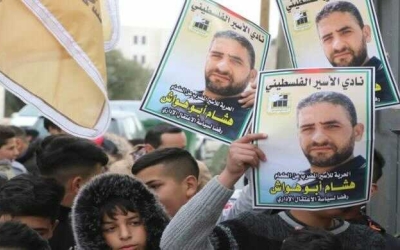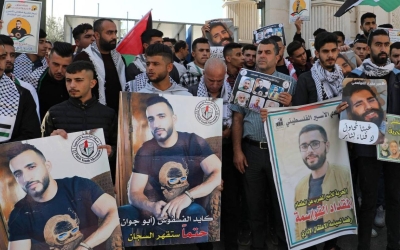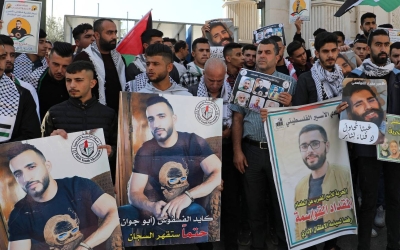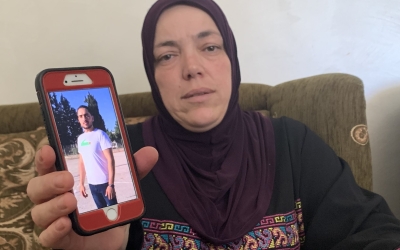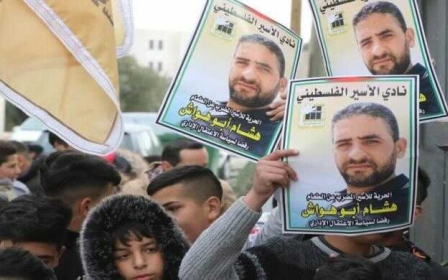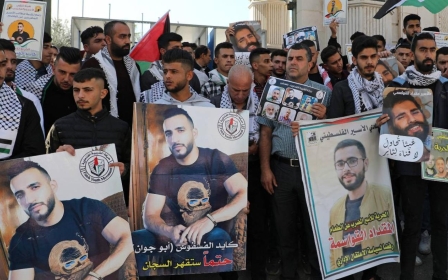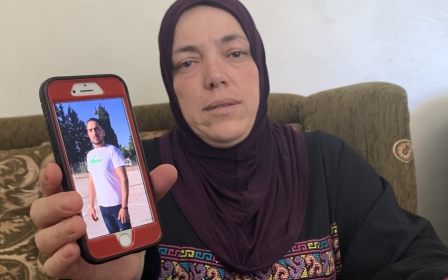Israel-Palestine: Family call for immediate release of hunger striker Abu Hawwash
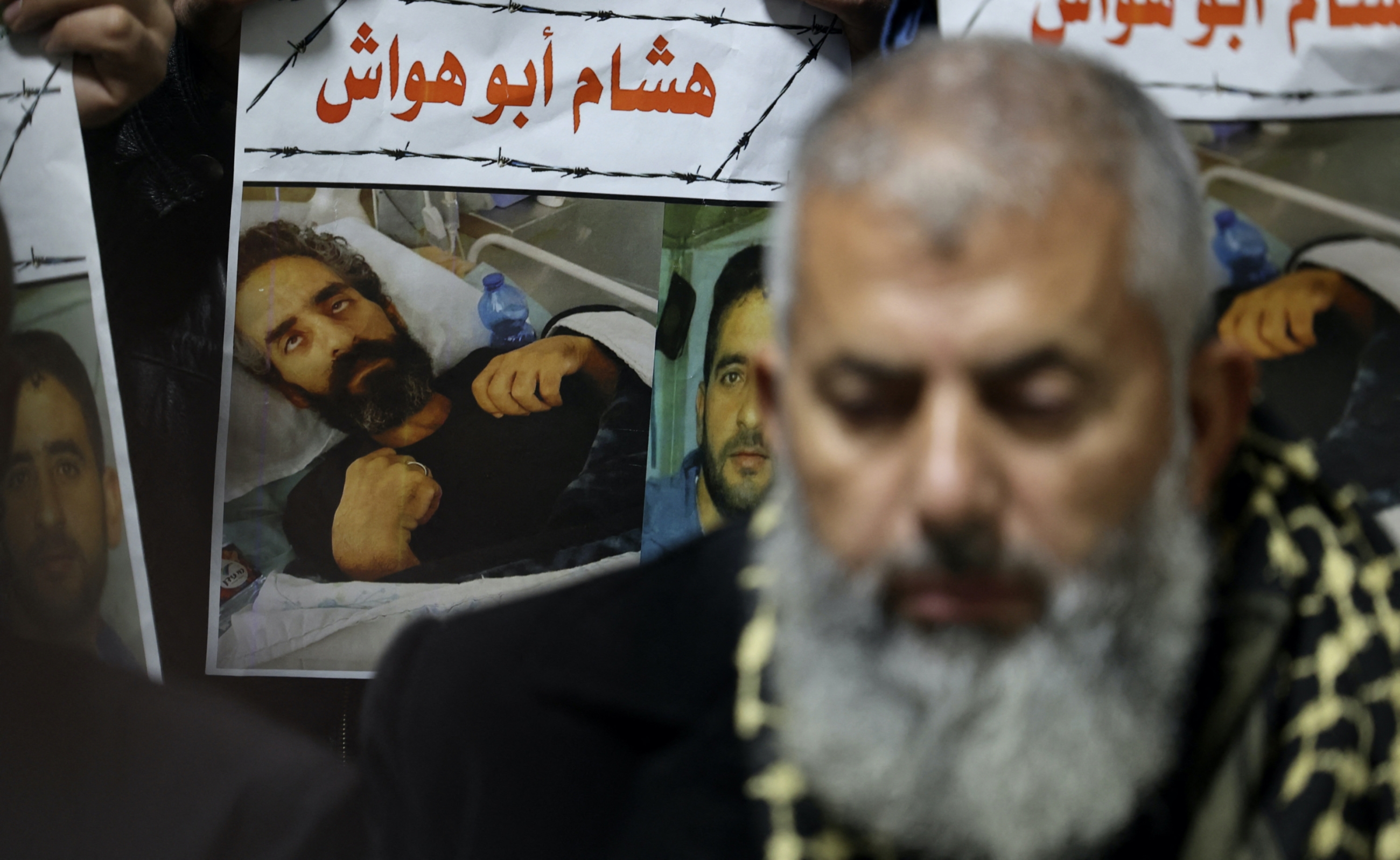
In the town of Dura, south of Hebron in the southern occupied West Bank, a crowd of Palestinians huddle around a fire, while dozens more sit in an empty garage, beneath an array of posters of Palestinian prisoner Hisham Abu Hawwash.
This has been the scene outside the Abu Hawwash family home for weeks, as the 41-year-old continued with a months-long hunger strike in protest against his administrative detention by Israel.
On Monday, Abu Hawwah’s health deteriorated rapidly as he entered the 140th day of his strike, and the tensions outside his home were palpable.
“We are in a very difficult situation,” Saed Abu Hawwash, Abu Hawwash’s older brother, told Middle East Eye from the sit-in outside his family’s home. “Hisham could die at any moment.”
According to his family, Hisham fell into a coma in the early hours of Monday morning, as his condition continued to worsen inside the Shamir Medical Center (Assaf Harofeh) south of Tel Aviv.
“Around 3am he entered into a coma, and his situation continues to worsen every hour, every minute,” Saed, 43, said.
“He has lost his ability to speak, he can barely move. The doctors said his muscles are beginning to atrophy.
“His heart has become weak, and they are scared that at any moment his heart or other organs could fail.
"He has lots of issues with his stomach, kidneys, and liver as a result of the lack of proper vitamins and enzymes,” Saed continued, adding that Abu Hawwash, along with his youngest son, six-year-old Ezz al-Din, both suffer from a pre-existing kidney condition that requires frequent treatment.
'The situation is very dire. We are worried that he could die at any moment'
- Saed Abu Hawwash, Abu Hawwash’s older brother
“The situation is very dire,” Saed said. “We are worried that he could die at any moment.”
This week, hundreds of other administrative detainees held by Israel began boycotting the Israeli legal system, refusing to appear in sessions in Israeli military courts and the country's Supreme Court.
Legal representatives of the detainees had announced in December that they would begin the boycott from 1 January 2022 and that if Israel continued the practice, the detainees could declare a general hunger strike.
'Unjust decision'
Abu Hawwash, a former prisoner who had been imprisoned by Israel for eight years - a period of which was spent under two separate administrative detention orders - was arrested by Israeli soldiers at his home in the middle of the night on 28 October 2020.
“We didn't know where he was for the first five days. After that, he was given an administrative detention order for six months,” said Saed.
Abu Hawwash’s detention was renewed once again in May 2021.
Months later, in August, after a significant effort by the family’s lawyers, his appeal against his detention order was brought before Israel's Supreme Court.
“On 15 August, after delaying their decision many times, the Supreme Court said it would not even open Hisham’s file until he had served two years in administrative detention,” said Saed.
“This was an unjust decision, and so two days later, on 17 August, Hisham started his hunger strike.”
Indefinite renewal
Israeli administrative detention orders are renewed for periods of three to six months and can be renewed indefinitely.
Under the pretext of secret evidence and closed files, Israel uses the policy to detain Palestinians without charge or trial.
Many Palestinian prisoners, including Abu Hawwash, have spent years in prison under the policy, which has been widely condemned by human rights groups.
Rights advocates say Israel uses the policy when it wants to target Palestinian political activists who it believes are security threats, but has no evidence to actually convict them of a crime.
“There are currently 500 Palestinians being held in administrative detention, but if you look at history, there have been hundreds of thousands of Palestinians who have been held under the policy,” Hisham Sharabati, a human rights advocate with Palestinian rights group Al-Haq, told MEE.
Sharabati pointed out that although international human rights law permits some limited use of administrative detention in emergency situations, Israel uses the practice as a continued policy against Palestinians under occupation.
“Israel uses this policy against political activists and the right of Palestinians to have freedom of expression,” he said.
“People are being put in arbitrary detention simply for their political beliefs, even without committing any so-called criminal actions.”
International attention
Abu Hawwash is the latest Palestinian administrative detainee whose hunger strike has captured international attention.
Last year, a number of Palestinian prisoners held under administrative detention underwent lengthy hunger strikes, with Abu Hawash’s strike being the longest.
In July, 28-year-old Ghadanfar Abu Atwan went on hunger strike for 65 days in protest against his administrative detention, the third time he was imprisoned by Israel under the policy, making a total of five years spent in detention, with no charge or trial.
As Abu Hawwash entered the third month of his strike in late October, he was joined by at least six other hunger-striking administrative detainees.
The Palestinian news agency Wafa identified the detainees as Kayed Fasfous, Miqdad Qawasmeh, Alaa Aaraj, Shadi Abu-Akr, Ayyad Hureimi, and Raafat Abu Rabee. Four of the six other detainees were also at least 60 days into a strike at the time.
Israeli authorities freed Fasfous earlier this month, two weeks after reaching a release deal on 23 November that ended his marathon 131-day hunger strike.
Qawasmeh also ended his strike in November after 113 days, upon an agreement to release him from detention in February 2022.
'Used as an example'
Coordinated hunger strikes by Palestinian political prisoners, like the Dignity Strike in 2017, are a common form of resistance used by prisoners, typically to achieve a list of demands centred around better treatment and conditions in prison.
In the case of administrative detainees, whose detention is renewable indefinitely, hunger strikes by prisoners like Abu Hawwash are often launched with the goal of being released.
The latest wave of hunger strikes is, according to Sharabati, part of a concerted effort made by administrative detainees to boycott their conditions.
Now, he believes Abu Hawwash is being “used as an example” by Israel to deter administrative detainees from any future escalations.
“Israel is sending a message to prisoners to not go on any more hunger strikes," said Sharabati.
"Administrative detainees were planning on escalating their measures, and this is Israel's way of putting them down,” Sharabati said. “I’m very worried.”
'The kids did not recognise Hisham'
After 132 days on hunger strike, Abu Hawwash was finally transferred to an Israeli civilian hospital last month, where he has continued to refuse vitamins and is surviving only on saltwater.
Three days after he arrived at the hospital, Abu Hawwash’s wife, Aisha, and two of their five children went to visit him in the hospital, after smuggling themselves into Israel, because the Israeli authorities denied their permit requests.
“I was with the children when they went to see Hisham, it was heartbreaking,” Saed said. “Everyone, including myself, immediately started crying.
'They couldn’t recognise their own father because of the toll that the strike had taken on his body'
- Saed Abu Hawwash, Abu Hawwash’s older brother
“The kids did not recognise Hisham, they couldn’t recognise their own father because of the toll that the strike had taken on his body.”
Abu Hawwash's brother Saed described the current situation for the family as “psychological torture”.
He said the family has exhausted all their options, appealing to international bodies, human rights organisations, Palestinian leaders, and regional actors, all to no avail.
On Tuesday, the family awaited a visit from the South African ambassador to Palestine, in the hope that more international attention over Hisham’s case could bring him closer to freedom.
“The world needs to uphold its responsibilities, and hold Israel accountable for all its crimes, including its policy of using administrative detention,” said Saed.
“This policy is no different from home demolitions and land confiscation.
"It’s just another tactic that Israel uses to destroy Palestinian life, and to try and force us out of our homeland.”
'Icon of resistance'
Abu Hawwash’s case has continued to gain traction on social media and has sparked protests and demonstrations across Palestine and Israel. Similar demonstrations are expected to take place in New York City on Tuesday.
With pressure mounting to release Abu Hawwash before the hunger strike claims his life, the family says that they will continue to stand with him until the end.
“We are with him in his decision, no matter what the outcome is," said Saed.
"Hisham today is not just representing himself, he is representing all Palestinian prisoners, who have been arrested for no reason other than demanding their freedom.
“No one accepts oppression, so why should Hisham, and all the other Palestinian prisoners?” he asked.
“Hisham has become an icon of resistance, and Israel is trying to make him fail. But we will stand with him till the end.”
Middle East Eye delivers independent and unrivalled coverage and analysis of the Middle East, North Africa and beyond. To learn more about republishing this content and the associated fees, please fill out this form. More about MEE can be found here.


